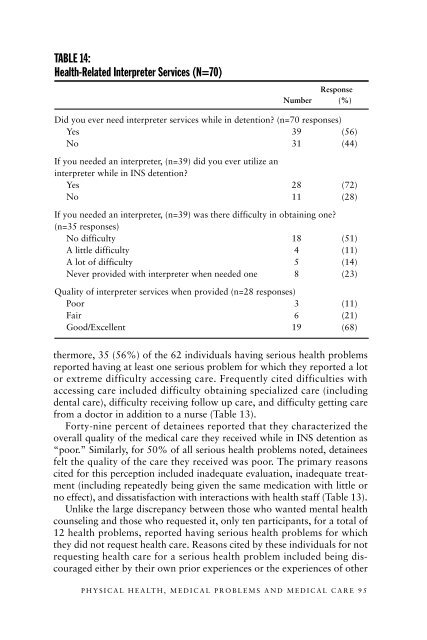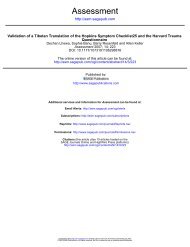- Page 2 and 3:
From Persecution to Prison:The Heal
- Page 4 and 5:
CONTENTSAcknowledgements . . . . .
- Page 6:
The Bellevue/NYU Program for Surviv
- Page 9 and 10:
don, Miranda Ip, and Meriam Alrashi
- Page 11 and 12:
Significant symptoms of depression
- Page 13 and 14:
Detained asylum seekers participati
- Page 15 and 16:
persecution, yet most emphasized ho
- Page 17 and 18:
In many facilities, the response to
- Page 19 and 20:
years in detention, she finally got
- Page 21 and 22:
abuse For example, while being take
- Page 23 and 24:
They didn’t let me use the phone
- Page 25 and 26:
intensely personal events they had
- Page 27 and 28:
Limitations of this study include t
- Page 29 and 30:
Non-governmental organizations serv
- Page 31 and 32:
22 FROM PERSECUTION TO PRISON
- Page 33 and 34:
the late 1990s ranging from 10 to 7
- Page 35 and 36:
Historical BackgroundFor most of th
- Page 37 and 38:
international standards with the 19
- Page 39 and 40:
apply for asylum make up the majori
- Page 41 and 42:
tion judge. 57 Yet in many parts of
- Page 43 and 44:
York and Newark, New Jersey has had
- Page 45 and 46:
trict began denying parole to them
- Page 47 and 48:
Correctional Facility in 2000. “[
- Page 49 and 50:
men of which 750 were detained on i
- Page 51 and 52:
from that same country from seeking
- Page 53 and 54: Detention Facilities in this StudyF
- Page 55 and 56: high reliability in numerous langua
- Page 57 and 58: 48 FROM PERSECUTION TO PRISON
- Page 59 and 60: York County Prison in York Pennsylv
- Page 61 and 62: TABLE 2:Demographic Characteristics
- Page 63 and 64: TABLE 4:Prevalence of Pre-Migration
- Page 65 and 66: on a part time basis, researchers w
- Page 67 and 68: Case #1(DK): “Loneliness and Fear
- Page 69 and 70: TABLE 6:Hopkins Symptom Checklist-2
- Page 71 and 72: TABLE 8:Harvard Trauma Questionnair
- Page 73 and 74: think such services were available.
- Page 75 and 76: When I am talking to you now it is
- Page 77 and 78: After being granted asylum and rele
- Page 79 and 80: “Being here is like going through
- Page 81 and 82: In my country even though I became
- Page 83 and 84: how long they were there - six mont
- Page 85 and 86: Thoughts of SuicideSeveral asylum s
- Page 87 and 88: here?’ I told the doctor, they br
- Page 89 and 90: Another subject reported a positive
- Page 91 and 92: substantial distance from their att
- Page 93 and 94: eported that her experience in dete
- Page 95 and 96: 86 FROM PERSECUTION TO PRISON
- Page 97 and 98: e somatic manifestations of the psy
- Page 99 and 100: Case #2 (JG): “Health Care in Cha
- Page 101 and 102: TABLE 11:Detainee Perceptions of He
- Page 103: TABLE 13:Availability and Quality o
- Page 107 and 108: Difficulty Obtaining Specialized Ca
- Page 109 and 110: Another detained asylum seeker repo
- Page 111 and 112: One detainee who speaks French and
- Page 113 and 114: 104 FROM PERSECUTION TO PRISON
- Page 115 and 116: Detention Facilities in this StudyS
- Page 117 and 118: even though many reported having ex
- Page 119 and 120: CASE #3 (HN): “SOLITARY CONFINEME
- Page 121 and 122: Here, I’m scared. In [the detenti
- Page 123 and 124: emote control and watch what he wan
- Page 125 and 126: Whenever someone misbehaves, they t
- Page 127 and 128: This subject was himself threatened
- Page 129 and 130: One detainee reported several incid
- Page 131 and 132: Some Process Exists to Respond to R
- Page 133 and 134: There were no witnesses other than
- Page 135 and 136: tion. An INS officer said they put
- Page 137 and 138: There is an Anglican minister who c
- Page 139 and 140: The dentists didn’t explain anyth
- Page 141 and 142: tion between dental age and chronol
- Page 143 and 144: Case #4 (LK): “Fifteen-Year-Old G
- Page 145 and 146: 136 FROM PERSECUTION TO PRISON
- Page 147 and 148: TABLE 16:Treatment/Abuses Reported
- Page 149 and 150: “There is no political asylum her
- Page 151 and 152: I was crying. I was so afraid with
- Page 153 and 154: save her life, but was not able to
- Page 155 and 156:
Case #5 (CR): “Begging for Mercy
- Page 157 and 158:
ehind and told me to sign. He physi
- Page 159 and 160:
days and it is now 2 years and four
- Page 161 and 162:
viewers asked for additional inform
- Page 163 and 164:
y study participants. In evaluating
- Page 165 and 166:
trast, under US law, detention of s
- Page 167 and 168:
nation for an asylum determination
- Page 169 and 170:
very negative effects of detention
- Page 171 and 172:
authority to grant asylum and with
- Page 173 and 174:
absconding.” 250 Since the passag
- Page 175 and 176:
said “[F]reedom from imprisonment
- Page 177 and 178:
Standards relevant to this study ar
- Page 179 and 180:
“detained person” generally as
- Page 181 and 182:
which they are charged and a fair h
- Page 183 and 184:
esponse to substantial public press
- Page 185 and 186:
specified procedures, provided they
- Page 187 and 188:
PunishmentThe Detention Standard on
- Page 189 and 190:
any time the detainee complains.”
- Page 191 and 192:
182 FROM PERSECUTION TO PRISON
- Page 193 and 194:
while in detention, thus adding to
- Page 195 and 196:
Establish a Uniform National Parole
- Page 197 and 198:
that effect. These officers should
- Page 199 and 200:
Besides their inaccuracy, these exa
- Page 201 and 202:
friends so asylum seekers can maint
- Page 203 and 204:
appropriate staffing of such groups
- Page 205 and 206:
efugees and asylum seekers who win
- Page 207 and 208:
198 FROM PERSECUTION TO PRISON
- Page 209 and 210:
of thorough documentation. However,
- Page 211 and 212:
Human development is complex and di
- Page 213 and 214:
18. Country from which fleeing pers
- Page 215 and 216:
9. Being close to death.10. Forced
- Page 217 and 218:
Complete for each health problem:5.
- Page 219 and 220:
Explain:(Interviewer: Write brief n
- Page 221 and 222:
2. Depression SymptomsA How much we
- Page 223 and 224:
B. You said that you have experienc
- Page 225 and 226:
Explain:13. How was your physical h
- Page 227 and 228:
Yes ...........1No............22. W
- Page 229 and 230:
Explain:20. At the time of your arr



